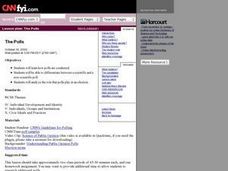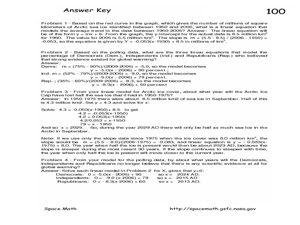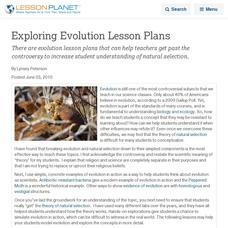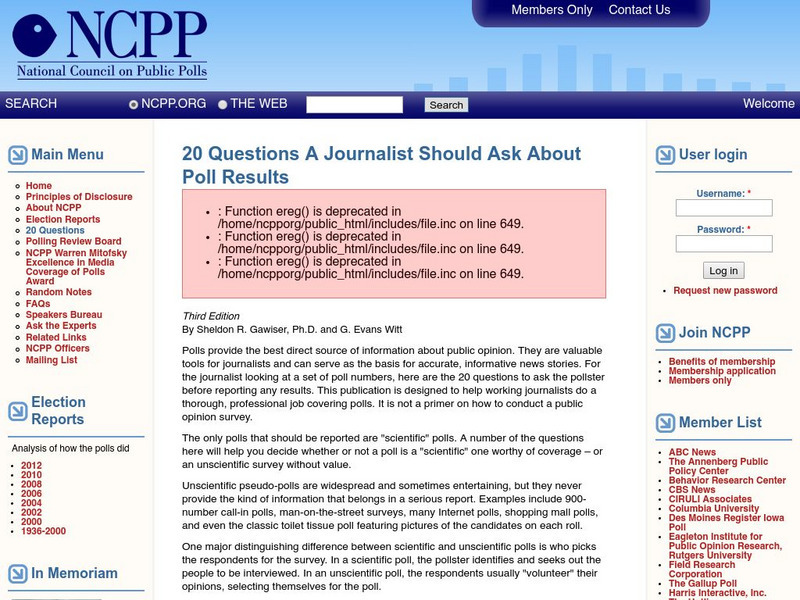Curated OER
The Polls
Students obtain how polls are conducted. They differentiate between scientific and non-scientific poll. They analyze the role that polls play in an election.
Curated OER
'Hunger Games' Science: Investigating Genetically Engineered Organisms
In The Hunger Games novel and movie, a futuristic, dystopian society is the setting. In it, a genetically engineered bird escapes control of the government. Using this as a starting point, teenagers examine the realistic possibility of...
Curated OER
Bias Sampling
Students explore statistics by conducting a scientific study. In this data analysis lesson, students conduct a class poll about popular foods of their classmates. Students complete a worksheet and discuss how bias opinions affect the...
Mathematics Assessment Project
Middle School Mathematics Test 1
A 13-page test contains two 40-minute sections, which provide word problems and applied analysis to cover material from pre-algebra through geometry.
Agency for Toxic Substances and Disease Registry
Don't Mess with Mercury (Lesson A)
Mercury is the only metal that is a liquid at room temperature. Teach your class this and many more interesting mercury facts by assigning an engaging task. A public relations activity, the exercise informs pupils of the hazards of...
Agency for Toxic Substances and Disease Registry
Don't Mess with Mercury (Lesson B)
At one point, people thought mercury was therapeutic for humans, but now we know it is highly toxic. The second of three activities covering mercury focuses on its health hazards if humans are exposed. Pairs research and answer questions...
Curated OER
Bias Sampling
Students demonstrate how the results of a poll or other scientific study can be biased by selecting special types of people to respond or by asking only certain questions.
Curated OER
Introduction to Biomes
Fifth graders use scientific skills and processes to recognize how living things depend on one another and on the environment for survival and the human use of natural resources impacts the environment. Explain how Earth's surface...
Curated OER
Who Says?
Students evaluate websites for scientific accuracy and usefulness. They explore various content evaluation criteria and observe a demonstration on evaluating web sites. They select and evaluate a website for its content information on a...
PBS
The History and Use of Sampling Methods
Young mathematicians define population, draw convenience sample from the population, draw quota sample from the population, and draw random probability sample from the population. They explain why a random probability sample usually...
Curated OER
Literacy Lesson: Guided Reading
Here is a wonderful instructional activity designed for students with special needs. This well-thought-out instructional activity uses Big Books, familiar stories, and has a lot of review learning built into it. The book, The Keeping...
Curated OER
Personal Narrative Paragraphs: Class Quilt
Begin this activity by asking third graders to bring from home pieces of cloth that represent something important to them. (Have extras for learners who need them.) They reflect on important events in their lives, compose narrative...
Curated OER
How to Write an Essay: Secondary ed.
Whether introducing the structure of expository essays or reviewing the format with your high schoolers, take the time to check out this resource. Examples of seven common forms of introductory paragraphs and six types of conclusions, as...
Curated OER
The Global Warming Debate and the Arctic Ice Cap
For this global warming and the Arctic ice cap worksheet, students use two graphs showing data about the amount of Arctic sea ice between 1950 and 2006 and the percent of people surveyed that believe the Earth has gotten warmer over the...
Curated OER
Exploring Evolution Lesson Plans
There are evolution lesson plans that can help teachers get past the controversy to increase student understanding of natural selection.
Curated OER
Sampling Rocks
Students examine rocks. In this geology lesson, students collect rocks from the schoolyard and classify them by color, weight, and size. Students use a rock guide to identify each of the rocks.
Curated OER
Opinion Surveys
Students examine the factors that affect the accuracy of opinion surveys. They calculate probability and chance using data they have collected. They practice reading tables and graphs as well.
Curated OER
Congressional Scenarios
In this U.S. government worksheet, students read 12 scenarios pertaining to government intervention and determine what to do as lawmakers in response to each of the scenarios.
Curated OER
How Psychologists Do Research
Students discover how psychologists complete their research on different topics. In groups, they describe the elements of an experiment and the importance of sampling during research. They identify ethical issues in their research and...
Curated OER
Land Biomes Research and Presentation
Fifth graders work in cooperative groups to research an assigned land biome using various sources. Groups create either a book or a PowerPoint presentation of their assigned land biome.
Other
Ncpp: 20 Questions a Journalist Should Ask About Poll Results
The NCPP site asks 20 questions journalists should consider when using poll information. Click on each question to get a discussion of the answer. A click on a sidebar gives analysis of polls from elections from 1936 to present.


